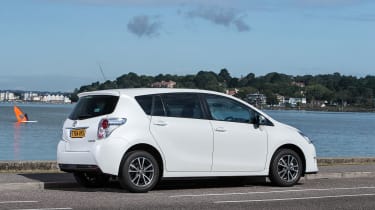Toyota Verso MPV (2013-2018) - Engines, drive & performance
The Toyota Verso is capable of carrying you and your brood around with ease, but it won’t give you much joy while doing so
You wouldn’t expect a spacious MPV to deliver a particularly entertaining driving experience, and predictably, this is the case with the Toyota Verso.
Toyota has made its suspension relatively stiff, so the body doesn’t sway too much around corners. It certainly isn’t uncomfortable, though: the set-up hits a decent balance between comfort and dynamic ability.
You’d still never call the Verso engaging – the steering is devoid of feel and gets too light at higher speeds. In this respect, the Toyota is no match for the Ford C-MAX, even if it’s more predictable and easy to drive at slower speeds in town.
No matter which Toyota Verso you choose, a high driving position and good visibility are big plus points.
Toyota Verso diesel engine
There’s only one diesel engine in the Toyota Verso, and it’s definitely a bit old-school in the way it performs. The turbo takes a few seconds to wake up and the engine runs out of puff at lower revs than would be ideal, so you end up having to change gear quite often. At least the six-speed gearbox is precise to use.
It’s also keen to let you know how hard it’s having to work, and sends far too much vibration up through the steering wheel and pedals. Nevertheless, it’s the pick of the available engines, not least because it’s the best for hauling around a family, which is, of course, what this car is all about.
Petrol engines
The 1.8-litre petrol comes as standard with an automatic gearbox, which saps performance to the extent that the bigger-engined Verso feels no faster than the version with the 1.6 petrol in situ. The 1.6-litre petrol engine is a decent performer, and definitely responds better the harder you rev it. But do that, and the relatively poor economy tumbles further.












